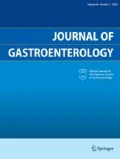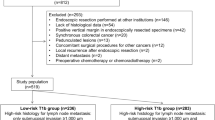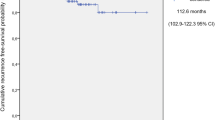Abstract
Background
Determining the depth of invasion of early stage colorectal cancer has been emphasized as a means of improving endoscopic diagnostic accuracy. Recent studies have focused on other pathological risk factors for lymph node metastasis (LNM). We investigated the significance of depth of invasion and predictive properties of other endoscopic findings.
Methods
We retrospectively investigated 846 patients with submucosal invasive (T1) colorectal cancer who received an accurate pathological diagnosis and were treated between January 2005 and December 2016. Pathological risk factors associated with LNM were reviewed. We divided patients into groups: low-risk T1 colorectal cancer (LRC; no risk factors) and high-risk T1 colorectal cancer (HRC; exhibiting lymphovascular invasion, tumor budding grade of 2/3, and/or poor differentiation) and studied predictive endoscopic factors for HRC.
Results
Significant risk factors for LNM in multivariate analysis were lymphovascular invasion [odds ratio (OR) 8.09; 95% confidence interval (CI) 3.84–17.1], tumor budding (OR 1.89; 95% CI 1.09–3.29), and histological differentiation (OR 2.09; 95% CI 1.12–3.89). The LNM-positive rate with only deep submucosal invasion was 1.6%. Significant predictive factors for HRC in multivariate analysis identified rectal tumor location (OR 1.92; 95% CI 1.35 –2.72, depression (OR 2.73; 95% CI 1.96 –3.80), protuberance within the depression (OR 2.58; 95% CI 1.39– 4.78), expansiveness (OR 2.39; 95% CI 1.27– 4.50), and loss of mucosal patterns (OR 1.90; 95% CI 1.20 –3.01) as significant factors.
Conclusions
Rectal tumor location, depression, protuberance within the depression, expansiveness, and loss of mucosal patterns could be predictive factors for HRC.

Similar content being viewed by others
References
Muto T, Oya M. Recent advances in diagnosis and treatment of colorectal T1 carcinoma. Dis Colon Rectum. 2003;46:S89–93.
Asayama N, Oka S, Tanaka S, et al. Endoscopic submucosal dissection as total excisional biopsy for clinical T1 colorectal carcinoma. Digestion. 2015;91:64–9.
Saito Y, Inaba Y, Sasaki T, et al. Management of colorectal T1 carcinoma treated by endoscopic resection. Dig Endosc. 2016;28:324–9.
Watanabe T, Muro K, Ajioka Y, et al. Japanese Society for Cancer of the Colon and Rectum (JSCCR) guidelines 2016 for the treatment of colorectal cancer. Int J Clin Oncol. 2018;23:1–34.
Glasgow SC, Bleier JI, Burgart LJ, et al. Meta-analysis of histopathological features of primary colorectal cancers that predict lymph node metastases. J Gastrointest Surg. 2012;16:1019–28.
Meining A, von Delius S, Eames TM, et al. Risk factors for unfavorable outcomes after endoscopic removal of submucosal invasive colorectal tumors. Clin Gastroenterol Hepatol. 2011;9:590–4.
Yamamoto S, Watanabe M, Hasegawa H, et al. The risk of lymph node metastasis in T1 colorectal carcinoma. Hepatogastroenterology. 2004;51:998–1000.
Lim SB, Yu CS, Jang SJ, et al. Prognostic significance of lymphovascular invasion in sporadic colorectal cancer. Dis Colon Rectum. 2010;53:377–84.
Wada H, Shiozawa M, Katayama K, et al. Systematic review and meta-analysis of histopathological predictive factors for lymph node metastasis in T1 colorectal cancer. J Gastroenterol. 2015;50:727–34.
Bosch SL, Teerenstra S, de Wilt JH, et al. Predicting lymph node metastasis in pT1 colorectal cancer: a systematic review of risk factors providing rationale for therapy decisions. Endoscopy. 2013;45:827–34.
Yoda Y, Ikematsu H, Matsuda T, et al. A large-scale multicenter study of long-term outcomes after endoscopic resection for submucosal invasive colorectal cancer. Endoscopy. 2013;45:718–24.
Beaton C, Twine CP, Williams GL, et al. Systematic review and meta-analysis of histopathological factors influencing the risk of lymph node metastasis in early colorectal cancer. Colorectal Dis. 2013;15:788–97.
Tateishi Y, Nakanishi Y, Taniguchi H, et al. Pathological prognostic factors predicting lymph node metastasis in submucosal invasive (T1) colorectal carcinoma. Mod Pathol. 2010;23:1068–72.
Tominaga K, Nakanishi Y, Nimura S, et al. Predictive histopathologic factors for lymph node metastasis in patients with nonpedunculated submucosal invasive colorectal carcinoma. Dis Colon Rectum. 2005;48:92–100.
Overwater A, Kessels K, Elias SG, et al. Endoscopic resection of high-risk T1 colorectal carcinoma prior to surgical resection has no adverse effect on long-term outcomes. Gut. 2018;67:284–90.
Chen T, Zhang YQ, Chen WF, et al. Efficacy and safety of additional surgery after non-curative endoscopic submucosal dissection for early colorectal cancer. BMC Gastroenterol. 2017;17:134.
Kobayashi H, Mochizuki H, Morita T, et al. Characteristics of recurrence after curative resection for T1 colorectal cancer: Japanese multicenter study. J Gastroenterol. 2011;46:203–11.
Miyachi H, Kudo SE, Ichimasa K, et al. Management of T1 colorectal cancers after endoscopic treatment based on the risk stratification of lymph node metastasis. J Gastroenterol Hepatol. 2016;31:1126–32.
Nakadoi K, Tanaka S, Kanao H, et al. Management of T1 colorectal carcinoma with special reference to criteria for curative endoscopic resection. J Gastroenterol Hepatol. 2012;27:1057–62.
Oka S, Tanaka S, Nakadoi K, et al. Risk analysis of submucosal invasive rectal carcinomas for lymph node metastasis to expand indication criteria for endoscopic resection. Dig Endosc. 2013;25:21–5.
Kim B, Kim EH, Park SJ, et al. The risk of lymph node metastasis makes it unsafe to expand the conventional indications for endoscopic treatment of T1 colorectal cancer: a retrospective study of 428 patients. Medicine (Baltimore). 2016;95:e4373.
Oba S, Tanaka S, Oka S, et al. Characterization of colorectal tumors using narrow-band imaging magnification: combined diagnosis with both pit pattern and microvessel features. Scand J Gastroenterol. 2010;45:1084–92.
Kudo S, Tamura S, Nakajima T, et al. Diagnosis of colorectal tumorous lesions by magnifying endoscopy. Gastrointest Endosc. 1996;44:8–14.
Tanaka S, Asayama N, Shigita K, et al. Towards safer and appropriate application of endoscopic submucosal dissection for T1 colorectal carcinoma as total excisional biopsy: future perspectives. Dig Endosc. 2015;27:216–22.
Kanda Y. Statistical analysis using freely-available “EZR (Easy R)” software. Rinsho Ketsueki. 2015;56:2258–66.
Wada H, Shiozawa M, Sugano N, et al. Lymphatic invasion identified with D2–40 immunostaining as a risk factor of nodal metastasis in T1 colorectal cancer. Int J Clin Oncol. 2013;18:1025–31.
Ishii M, Ota M, Saito S, et al. Lymphatic vessel invasion detected by monoclonal antibody D2–40 as a predictor of lymph node metastasis in T1 colorectal cancer. Int J Colorectal Dis. 2009;24:1069–74.
Harris EI, Lewin DN, Wang HL, et al. Lymphovascular invasion in colorectal cancer: an interobserver variability study. Am J Surg Pathol. 2008;32:1816–21.
Wang H, Wei XZ, Fu CG, et al. Patterns of lymph node metastasis are different in colon and rectal carcinomas. World J Gastroenterol. 2010;16:5375–9.
Ikematsu H, Yoda Y, Matsuda T, et al. Long-term outcomes after resection for submucosal invasive colorectal cancers. Gastroenterology. 2013;144:551–9.
Ichimasa K, Kudo SE, Miyachi H, et al. Comparative clinicopathological characteristics of colon and rectal T1 carcinoma. Oncol Lett. 2017;13:805–10.
Nascimbeni R, Burgart LJ, Nivatvongs S, et al. Risk of lymph node metastasis in T1 carcinoma of the colon and rectum. Dis Colon Rectum. 2002;45:200–6.
Aytac E, Gorgun E, Costedio MM, et al. Impact of tumor location on lymph node metastasis in T1 colorectal cancer. Langenbecks Arch Surg. 2016;401:627–32.
Keum MA, Lim SB, Kim SA, et al. Clinicopathologic factors affecting recurrence after curative surgery for stage 1 colorectal cancer. J Korean Soc Coloproctol. 2012;28:49–55.
Acknowledgements
We would like to thank Editage (http://www.editage.jp) for English language editing.
Author information
Authors and Affiliations
Corresponding author
Ethics declarations
Conflict of interest
The authors declare that they have no conflict of interest.
Additional information
Publisher's Note
Springer Nature remains neutral with regard to jurisdictional claims in published maps and institutional affiliations.
Rights and permissions
About this article
Cite this article
Yasue, C., Chino, A., Takamatsu, M. et al. Pathological risk factors and predictive endoscopic factors for lymph node metastasis of T1 colorectal cancer: a single-center study of 846 lesions. J Gastroenterol 54, 708–717 (2019). https://doi.org/10.1007/s00535-019-01564-y
Received:
Accepted:
Published:
Issue Date:
DOI: https://doi.org/10.1007/s00535-019-01564-y




